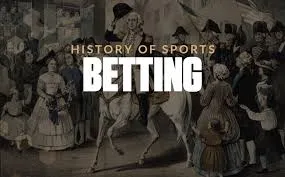
The History of Sports Betting From Ancient Times to Modern Day
Sports betting has been around for centuries, with evidence of it dating back to ancient civilizations such as the Greeks and Romans. It has evolved over time, from simple wagers among friends to a multi-billion dollar industry. Today, sports betting is not only popular in traditional brick-and-mortar casinos but also online through various platforms. In this article, we will dive into the fascinating history of sports betting, from its origins to the modern-day landscape.
1. Ancient Origins of Sports Betting

1.1 Early Forms of Wagering on Sporting Events
The earliest records of sports betting can be traced back to ancient Greece, where people would place bets on events like the Olympic Games. These bets were not only limited to the outcome of the games but also included things like who would win a particular event or how many events an athlete would win. The Greeks also had a form of gambling called “The Lydian Game”, where people would bet on the outcome of wrestling matches.
In ancient Rome, betting on chariot races was a popular pastime. The races, known as “ludi circenses”, attracted huge crowds and significant amounts of money were wagered on the outcomes. This led to the development of bookmaking, where people would take bets and offer odds on the races.
1.2 Betting in the Middle Ages and Renaissance Period
During the Middle Ages, gambling was frowned upon by the church, and sports betting was no exception. However, some forms of sports betting still existed, such as cockfighting and horse racing. In the 14th century, football (soccer) became a popular sport in Europe, and it wasn’t long before people started placing bets on the games. These bets were usually made between friends or in taverns.
The Renaissance period saw a resurgence in interest in sports betting, particularly in England. It is during this time that the first recorded sports betting event took place – a horse race between English and Spanish knights. This paved the way for the development of organized horse racing and more formalized betting.
2. The Evolution of Sports Betting in the 19th Century

2.1 The Emergence of Bookmaking
The 19th century saw significant developments in sports betting, with the emergence of bookmakers who would offer odds on various sporting events. Horse racing continued to be the most popular sport for betting, but other sports like boxing and baseball also gained traction. This was also the time when the concept of spread betting was introduced, where bookmakers would offer odds on the margin of victory rather than just the outcome of a game.
2.2 The Rise of Professional Gambling
With the arrival of the industrial revolution, there was a sharp increase in leisure time for the working-class population. This led to the rise of professional gambling, and many bookmakers became successful businessmen. It was during this time that the term “bookie” came into existence, which is still used today to refer to a person who takes bets on sporting events.
3. Sports Betting in the 20th and 21st Centuries
3.1 The Impact of Technology
The 20th century brought about significant changes in the world of sports betting due to advancements in technology. The introduction of telephones and telegraph meant that bookmakers could communicate with each other and exchange information quickly. This allowed them to offer odds on events taking place in different locations simultaneously.
The invention of radio and later television also had a profound impact on sports betting as people could now follow games in real-time and place bets accordingly. The advent of computers and the internet further revolutionized the industry, making it possible for people to bet on sports from the comfort of their own homes.
3.2 Legalization and Regulation of Sports Betting
In the early 20th century, sports betting was illegal in most countries, with the exception of horse racing. However, as attitudes towards gambling began to shift, more and more countries started legalizing and regulating sports betting. In the United States, the Professional and Amateur Sports Protection Act (PASPA) was passed in 1992, which banned sports betting in all states except Nevada. This law was overturned in 2018 by the Supreme Court, giving individual states the right to legalize sports betting.
Europe has had a more liberal approach towards sports betting, with many countries legalizing it in the early 20th century. However, the rise of online sports betting led to the need for more comprehensive regulations. The United Kingdom passed the Gambling Act in 2005, which laid the groundwork for online sports betting licenses and regulation of the industry.
4. The Modern-Day Landscape of Sports Betting

4.1 The Growth of Online Sports Betting
The advent of the internet opened up a whole new world for sports betting, making it more convenient and accessible than ever before. Today, there are thousands of online sports betting sites, offering a wide range of markets and competitive odds. This has made it possible for people from all over the world to bet on their favorite sporting events, regardless of their location.
4.2 The Proliferation of In-Play Betting
One of the most significant changes in recent years has been the rise of in-play or live betting. This allows bettors to place wagers on an event while it is still ongoing, giving them a chance to react to changing circumstances and potentially maximize their winnings. In-play betting has become increasingly popular and is now offered by almost all online sportsbooks.
4.3 The Impact of Fantasy Sports
Another significant development in the world of sports betting has been the rise of fantasy sports. This is a form of betting where participants assemble imaginary teams made up of real players and compete against each other based on the performance of their chosen players in real games. While it may not be considered traditional sports betting, it has become a multi-billion dollar industry and has attracted a younger demographic to the world of sports betting.
5. The Future of Sports Betting

The future of sports betting looks bright, with more and more countries legalizing and regulating it. The increasing use of technology and the internet means that the industry will continue to evolve and adapt to changing consumer trends. Some experts predict that virtual reality and augmented reality will play a significant role in the future of sports betting, providing a more immersive and interactive experience for bettors.
6. Conclusion
Sports betting has come a long way since its ancient origins, evolving into a global industry worth billions of dollars. It has survived through countless obstacles and continues to thrive, thanks to technological advancements and changing attitudes towards gambling. As we look to the future, one thing is certain – sports betting will continue to capture the imagination of people around the world and remain an integral part of the sporting experience.


